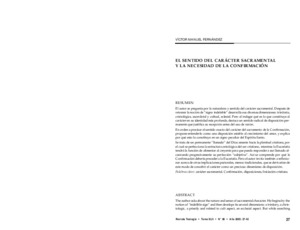Por favor, use este identificador para citar o enlazar este ítem:
https://repositorio.uca.edu.ar/handle/123456789/18336| Título: | El sentido del carácter sacramental y la necesidad de la confirmación | Autor: | Fernández, Víctor Manuel | Palabras clave: | SACRAMENTO; EUCARISTIA; CONFIRMACION | Fecha de publicación: | 2005 | Editorial: | Pontificia Universidad Católica Argentina. Facultad de Teología | Cita: | Fernández, V. M. El sentido del carácter sacramental y la necesidad de la confirmación [en línea]. Teología. 2005, 42 (86). Disponible en: https://repositorio.uca.edu.ar/handle/123456789/18336 | Resumen: | Resumen: El autor se pregunta por la naturaleza y sentido del carácter sacramental. Después de
retomar la noción de “signo indeleble” desarrolla sus diversas dimensiones: trinitaria,
cristológica, sacerdotal y cultual, eclesial. Pero al indagar qué es lo que constituye al
carácter en su identidad más profunda, destaca un sentido radical de disposición permanente
que justifica su recepción antes del uso de razón.
En orden a precisar el sentido exacto del carácter del sacramento de la Confirmación,
propone entenderlo como una disposición estable al crecimiento del amor, y explica
por qué esto lo constituye en un signo peculiar del Espíritu Santo.
Se trata de un permanente “llamado” del Dios amante hacia la plenitud cristiana, por
el cual se perfecciona la estructura ontológica del ser cristiano, mientras la Eucaristía
tendrá la función de alimentar al creyente para que pueda responder a ese llamado alcanzando
progresivamente su perfección “subjetiva”. Así se comprende por qué la
Confirmación debería preceder a la Eucaristía. Pero el autor invita también a reflexionar
acerca de otras implicaciones pastorales, menos tradicionales, que se derivarían de
este modo de concebir el carácter como un precioso dinamismo de disposición. Abstract: The author asks about the nature and sense of sacramental character. He begins by the notion of “indelible sign” and then develops its several dimensions: a trinitary, a christologic, a priestly and related to cult aspect, an ecclesial aspect. But while searching where does the deepest identity of character belong, the author points out a radical sense of permanent disposition; it is therefore justified to receive the Sacrament before the age of reason. In order to point out the precise meaning of character in the sacrament of Confirmation, he suggests to understand it as a permanent disposition towards growth in love, and he explains why this makes character a particular sign of the Holy Ghost: it is a permanent “call” of the loving God towards Christian fulfillment, by whose means the ontologic structure of human being is perfected, while Eucharist should nurture the believer in order to be able to answer that call, timely reaching his “subjective” perfection. So we understand why Confirmation should precede Eucharist. The author invites us to rethink some other less traditional pastoral implications, based on this way of understanding character as a precious strength of disposition. |
URI: | https://repositorio.uca.edu.ar/handle/123456789/18336 | ISSN: | 0328-1396 (impreso) 2683-7307 (online) |
Disciplina: | TEOLOGIA | Derechos: | Acceso abierto | Fuente: | Teología. 2005, 42 (86) |
| Aparece en las colecciones: | TEO - 2005 Tomo XLII nro. 086 TEO - 2005 Tomo XLII nro. 086 |
Ficheros en este ítem:
| Fichero | Descripción | Tamaño | Formato | |
|---|---|---|---|---|
| sentido-caracter-sacramental-cofirmacion.pdf | 64,24 kB | Adobe PDF |  Visualizar/Abrir |
Este ítem está sujeto a una Licencia Creative Commons

